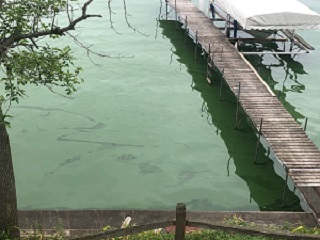The Case for Iowa's Lakes
posted
by Alicia Vasto on Friday, September 6, 2019
All summer long – in fact, all year long – IEC has been keeping a close eye on the health and vitality of Iowa’s lakes and waterways. We’ve seen algae blooms, E. coli advisories, microcystin concerns, runoff issues, and much more across the state this summer. One area we’ve been particularly engaged with in 2019 is the Iowa Great Lakes region (Spirit Lake and the Okobojis), which we see as a model of what other lakes in Iowa could offer to their local communities and visitors from around the state.
.png)
In early August, IEC’s water team visited the area, meeting with local leaders, residents, and groups to hear their primary water quality and lake concerns. In some cases, those concerns were similar to what we hear around the rest of the state – algae blooms due to excess nutrients, bacterial pollution like E. coli (Emerson Bay Beach on West Lake Okoboji experienced three advisories this summer) and turbidity.
But some other issues they raised were less familiar, like zebra mussels and water levels, but also development pressure and overcrowding. Development and crowding are not unique to the Iowa Great Lakes, but they were top of mind for many locals. There is a sense that these lakes are getting “loved to death” thanks to the area’s natural beauty, abundance of activities, and historically good water quality.
Looking at the numbers it’s not hard to see why. Three of the top ten lakes based on visitation in Iowa are Great Lakes – West Okoboji, East Okoboji, and Big Spirit Lake. In total, the Great Lakes area draws in more than 15% of the total statewide spending and job effects of recreational lakes. This amounts to more than $286 million per year in tourism and travel-related spending and approximately 2,000 jobs, based on 2017 data. In fact, more than 20% of the jobs in Dickinson County are related to the lakes.
What would a fraction of that kind of spending do for your county? For your town? For your business? What would even a small number of employment options mean for your area?
An interesting point brought up during the visits was the idea that if other lakes in the state had better water quality, it would take some crowding pressure off the Iowa Great Lakes. According to the U.S. Travel Association, travel and tourism is the seventh largest employment sector in Iowa. We have the resources to increase tourism and recreation as economic drivers – now we need just need to ensure those resources are clean and inviting to make that tourism happens.
Unfortunately, that’s where the state seems to come up short. This summer, there were 24 beach advisories for microcystin and 60 advisories for E. coli across the state. That represents a 300% increase in microcystin advisories from 2018. This trend is disappointing when we think about not only lost tourism opportunities, but also about the Iowans that want to live, work, and play here.
 Every time a beach has a warning for microcystin or E. coli, it represents lost opportunity for recreation and tourism dollars. Cleaner lakes could replicate the spending and tourism dollars that are brought into the Great Lakes area in their own local communities.
Every time a beach has a warning for microcystin or E. coli, it represents lost opportunity for recreation and tourism dollars. Cleaner lakes could replicate the spending and tourism dollars that are brought into the Great Lakes area in their own local communities.
It's time to put our money where our mouths – and our boats, fishing poles, and splash pads – are. Mandatory conservation practices to reduce pollution at the source, adequate funding for water quality monitoring and enforcement by the DNR, and significant progress with the Nutrient Reduction Strategy are just a few of the measures we are calling for to clean up and preserve Iowa’s waters over the next few months and throughout the Legislative Session.
Thank you for subscribing and following along with us this summer, and please stay involved with water quality issues by signing up for our Legislative News Bulletin, attending our Environmental Lobby Day at the Capitol on March 11, and continuing the conversation with us about the importance of water quality in Iowa. Please also join us for the End of Summer Beach Bash at Confluence Brewing on September 10, where we will be training attendees to write opinion columns and become advocates for Iowa’s water. We hope to see you there!
- beach advisories
- dnr
- drinking water
- microcystin
- public beaches
- toxic algae
- water quality